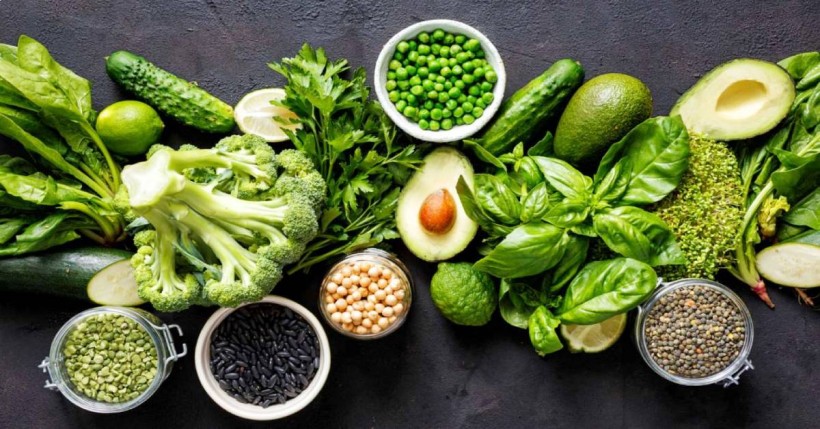20 Healthiest Green And Most Nutrient Dense Vegetables To Eat Everyday
Warning: Undefined variable $post in /home/energypo/domains/dietoflife.com/public_html/wp-content/plugins/code-snippets/php/snippet-ops.php(663) : eval()'d code on line 3
Warning: Attempt to read property "ID" on null in /home/energypo/domains/dietoflife.com/public_html/wp-content/plugins/code-snippets/php/snippet-ops.php(663) : eval()'d code on line 3
The estimated reading time is 12 minutes
Warning: Undefined variable $post in /home/energypo/domains/dietoflife.com/public_html/wp-content/plugins/oxygen/component-framework/components/classes/code-block.class.php(115) : eval()'d code on line 3
Warning: Attempt to read property "ID" on null in /home/energypo/domains/dietoflife.com/public_html/wp-content/plugins/oxygen/component-framework/components/classes/code-block.class.php(115) : eval()'d code on line 3

It is not a secret that eating vegetables can make a big impact on your life and you will be on a way to having a healthier and longer life. They are a gift from nature and are filling, flavorful, and perfect for various types of dishes, such as soups, salads, smoothies, and sandwiches.
If you look out to incorporate more nutrients into your diet, green vegetables are the easiest way to do it. Dark green vegetables are particularly rich in antioxidants, B vitamins, and minerals and are great for boosting your immunity there are many studies that confirmed that increased intake of vegetables leads to a lowered risk of getting many chronic diseases such as diabetes, heart disease, and certain types of cancer. (1) They are also very low on carbs and can prevent excessive gain weight.
Dietary Guidelines for Americans recommend people to consume about two and a half cups of vegetables per day. Here is the list of the healthiest green vegetables that should be part of your diet, if possible every day.
10 Healthiest Green Vegetables
1. Spinach
One of the most versatile and healthiest vegetables, it can be eaten raw, steamed, in a salad, or simply use it to boost your green smoothie. Just one cup covers entirely your daily requirement of vitamin K and is an excellent source of antioxidant vitamins A and C.
It is one of the most important sources of flavonoid quercetin that plays an important role in fighting the oxidative damage in your body that can be related to many chronic illnesses. One study confirmed that this antioxidant can alleviate inflammation and improve the condition in patients with rheumatoid arthritis (RA). (2)
When cooked, it’s a great source of iron (more than one-third of your daily requirement) and it is perfect to be combined with fruits or vegetables rich in vitamin C such as strawberries or lemons.
It is a perfect salad base and it is great when stirred into your morning omelet.
2. Asparagus
In every 90 gr of serving it contains around 34 % of daily folate intake which is an essential nutrient for red cell formation and in pregnancy. It is also rich in vitamins A, and K and it is full of antioxidants such as vitamins C and E and flavonoids quercetin, isorhamnetin and kaempferol. (3)
One study found that it can reduce oxidative stress and protect the liver and kidney damage. (4)
3. Broccoli
Broccoli is one of the best vegetables for health as the fibers in the broccoli is very helpful in boosting the immune system and formation of healthy gut bacteria.
They can be eaten raw or cooked, but the cooking methods may reduce some of their nutrients, particularly vitamin C as well as soluble proteins and sugars. Steaming is the best cooking method if you want to keep all the nutrients on the highest level and reap all the benefits from it. (5)
It is rich in a very powerful phytonutrient sulphoraphane that can be found in every cruciferous vegetable, but broccoli is the best source. Sulphoraphane may have anti-cancer properties and reduce the risk of getting cancer. (6)
4. Kale
Kale is called the king of green vegetables. Kale is rich in lutein which is very beneficial for heart and eye health and decreases the macular degeneration that comes with age. One serving of kale contains 22 mg of lutein. It also provides 10 % of the daily requirements of calcium and Glucosinolates (GSL) also naturally occur in it that might fight cancer. (7)
5. Brussels sprouts
They are very similar to broccoli and are part of the cruciferous vegetable family and are rich in fiber that promotes bowel regularity and lowers blood sugar. Very similar to broccoli, they are packed with vitamins and nutrients such as vitamin K, A, and C. (8) They contain antioxidant kaempferol that fights oxidative stress and boosts immunity.
6. Swiss chard
This vegetable is impressive for its wide array of nutrients and vitamins and it belongs to the same family as beets and spinach. It is rich in antioxidants that can help against radical damage and decrease your chances of getting some chronic diseases. (9)
7. Frozen peas
It is always to have them in the freezer and to prepare a nice meal for your family. They are very popular vegetables and are rich in fiber and antioxidants. They are considered starchy vegetables along with potatoes and there are different varieties of peas available. They are an excellent source of protein and have a relatively low glycemic index which makes them great for regulating blood sugar levels. (10)
It is rich in minerals and vitamins that are great for fighting cardiovascular diseases and help to reduce the risk of getting diabetes.
8. Collard greens
They provide a high dose of vitamin K which is very important for the prevention of osteoporosis and bone fracture. (11)
It is a cruciferous vegetable and as mentioned for all other cruciferous vegetables it has anti-cancer properties. It is high in fiber and can help you with digestion. They also contain one neurotransmitter choline that helps with memory functions, sleep and mood, and chronic inflammation.
9. Cabbage
It is full of fiber and great for digestion and regular bowel movement. It can help you in weight loss as it is very low in calories and high in water content. It is rich in vitamins C and K that can strengthen your bones. It fights inflammation and alleviates breast pain, swelling and inflammation in the postpartum period. (12)
10. Romaine lettuce
It is loaded with vitamin C, beta carotene, and fiber that can help in reducing cholesterol levels. It is rich in vitamin C, K, A, and folate. It is high in minerals and low in fiber. It originated in Rome and grows well in a Mediterranean climate. It has a high level of potassium that may help the blood pressure and reduce the risk of stroke. The high level of vitamin A protects the eye and your vision.
10 Most Nutrient Dense Vegetables To Eat Everyday
Although all vegetables are healthy and you should be part of your regular diet, we offer you a list of our favorites that are most nutrient-dense and should be included in your diet every day.
1. Tomatoes
This vegetable is probably on your daily menu and there are so many reasons why they should be part of your everyday dishes. They are already part of the healthy Mediterranean diet that is proven to have lower death rates from cancer and many diseases.
They are rich in four carotenoids :
- alpha- and beta-carotene
- lutein
- and lycopene
Being rich in lycopene that has anti-cancer properties and along with broccoli prevents prostate cancer.
Lutein and zeaxanthin from tomatoes may protect your eyes. It may also boost your immunity, and alleviates inflammation and lower the cholesterol levels in your blood.
One of the best vegetables to eat on daily basis and to become part of your healthy lifestyle.
2. Beets
This vegetable contains almost all of the vitamins and minerals your body needs. (13)
This vegetable is very good for heart health and its nitrates help in lowering blood pressure and preventing heart diseases. It is also rich in folate which is very important for growth and heart health. (14)
It may support brain health by promoting the dilation of the blood vessels and by increasing the blood flow into the brain. (15)
It may improve athletic performance and improve the effects of training and it is a great nutritional supplement for athletes. (16)
3. Mushrooms
Mushrooms are a great meat alternative as they are rich in protein and fiber. They are rich in beta-glucans that is some sort of fiber that promotes heart health and boosts your immunity. They are rich in B vitamins, copper, and potassium that are good for red cell formation and maintaining healthy skin and a healthy nervous system.
4. Carrots
They contain four times the recommended intake of vitamin A which helps your vision, especially in the nighttime. They contain several other vitamins and minerals and contain carotenoids that can help you in boosting your immunity and help you against some types of cancer, such as breast cancer in women. (17)
5. Bell peppers
They contain more vitamin C than an orange and are very low in calories. It should be a must on your grocery list. It will cover your daily requirement of vitamin C and vitamin B, beta carotene and they are easy to prepare. You can eat them raw to roast them until tender.
6. Cauliflower
It is very rich in water and fiber and can decrease the chances of getting diabetes and heart diseases and help you in weight loss. Being rich in fiber, it helps you with digestion and also boosts your immunity and inflammation. It is also good for blood circulation and lowers the risk of cardiovascular problems. (18)
7. Onions
Due to their antioxidant properties, they may improve bone density, reduce inflammation and lower blood pressure. It has many antibacterial properties and it is very much used in folk medicine for the treatment of colds and coughs.
Its antioxidant compounds may protect against chronic diseases such as cancer and diabetes.
8. Garlic
Its organic sulfur compound allicin may inhibit the cancerous cells and block tumors. It has a long history as an infection fighter once again thanks to its compound allicin. It manages the cholesterol and high-pressure levels and acts as an anticoagulant to reduce the risk of heart attacks. (19)
9. Sweet potatoes
Similar to carrots they are rich in vitamin A and can help you with eye vision and fight cancer. They contain a special form of starch that can reduce insulin resistance and improve blood sugar levels. It is gluten-free and you can add it to your gluten-free diet. They curb the hunger pains and are incredibly filling.
10. Eggplants
Along with tomatoes they are part of the Mediterranean diet, which is one of the most nutritious and healthy diets. They are rich in minerals and vitamins and fiber that can help you with digestion and promote heart health. It is rich in iron and can help you to fight anemia. Its natural antioxidant manganese has anti-cancer properties.
7 Healthiest And Helpful Vegetables To Lose Weight
- Cucumbers are great for detoxification as they are rich in water and fiber. It contains 15 calories per 100 grams.
- Cabbage is low in calories and high in fiber and it contains only 22 calories in one cup it is very versatile and you can roast it or just eat it raw in a salad or add it to your favorite taco.
- Zucchini is very low in calories and you can easily swap it with your pasta and make some zucchini noodles. It has a neutral taste that can be made sweet and savory.
- Kale is also very low in calories and you add it to your smoothie as one cup of kale has only 7 calories, but it is very nutritious.
- Pumpkin is one of the vegetables to add to your weight loss diet. It is high in fiber and curbs hunger pangs. It boosts immunity and reduces stress and is rich in antioxidants.
- Carrots can increase fullness and may be very effective to add to your weight loss diet. (20)
- Romaine lettuce is a dieter's dream as it contains only 8 calories and can help you to lower cholesterol levels.
Keto-Friendly Vegetables
The Keto diet is a popular diet that restricts the intake of carbohydrates and put the body into a state of ketosis. Vegetables are very low in carbohydrates and there are some vegetables that are keto diet-friendly:
- Spinach – is one of the healthiest vegetables rich in iron and calcium and in antioxidants to help in the prevention of oxidative stress in your body
- Mushrooms – are excellent to be paired with eggs for breakfast and very low in carbohydrates (3,26 mg per 100 gr.) and high in potassium
- Cucumber is rich in many nutrients including vitamin K and it is very low in carb content 3.63 g per 100 g. (21)
- Broccoli – is packed with nutrients and fiber that can you feel great when you are on this diet and one cup of broccoli contains only 3,7 gr. Of crabs
- Tomatoes – are refreshing and low in calories and full of vitamins and antioxidants. One tomato contains only 5 gr. carbohydrates
- Celery – is rich in calcium and potassium and has anti-cancer properties. It contains 2.97 carbs per 100 g.
Vegetables To Avoid In Certain Health Conditions
There are some vegetables you should avoid if you have certain health conditions:
Heartburn
If you suffer from heartburn you should avoid eating acidic vegetables such as tomatoes. If you suffer from heartburn, you can keep a log to see how some food can make your condition worse.
Irritable bowel syndrome and excessive gas/bloating
There are some vegetables that your body finds hard to digest and can cause gas and constipation such as broccoli and cauliflower. Garlic and onion can also cause gas and are difficult to be ingested.
Kidney failure
If you have problems with your kidneys, you should avoid vegetables high in potassium and phosphorus. Patients with kidney disease should avoid foods such as asparagus, mushroom, potatoes, and Brussel sprouts.
Hypercarotenemia
This is a condition that is harmless, but you can experience it if you eat too many carrots. You will become jaundiced and your skin will get a yellow pigment, but you do not have anything to worry about as it goes away when you cut on their consumption.
Crohn’s disease
With patients with Crohn’s disease should eat gentle food and vegetables are sometimes not very gentle on the intestines and stomach.
Hypothyroidism
Cruciferous vegetables have a compound thiocyanates that can interfere with iodine absorption that leading to a condition called Hypothyroidism (underactive thyroid gland). If you have any thyroid issues, you should avoid taking them in large amounts.
Conclusion:
If you look out to incorporate more nutrients into your diet, green vegetables are the easiest way to do it. Dark green vegetables are particularly rich in antioxidants, B vitamins, and minerals and are great for boosting your immunity.
There are also vegetables that can help you in losing weight such as cucumber, pumpkin, zucchini, kale, and carrots.
Some vegetables should be avoided in certain health conditions and should not be consumed in high doses.












